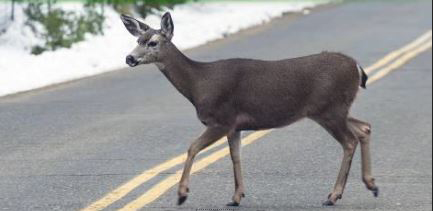November 4, 2023 - It’s that time of year when the California Department of Fish and Wildlife (CDFW) reminds drivers to be aware of wildlife on state roads and highways.
Every autumn, as Daylight Saving Time concludes, the number of vehicle-wildlife collisions on California roadways increases. As drivers adjust to less daylight during the evening  commute during the first week of November, please understand this is also the time of year that deer, elk, bears and other animals are typically on the move for migration, mating or foraging.
commute during the first week of November, please understand this is also the time of year that deer, elk, bears and other animals are typically on the move for migration, mating or foraging.
Collisions with wildlife can be dangerous and costly for drivers. Nearly 400 people were injured in more than two thousand collisions in 2019 involving wildlife, according to the California Highway Patrol. Also, the UC Davis Road Ecology Center estimates the total annual cost of animal-vehicle conflicts in California to be about $250 million.
“Wildlife-vehicle collisions pose an increasingly significant threat to both people and wildlife and can result in serious injury or death. This time of year, large native species such as deer and elk are more likely to cross highways or roads during their mating season (rut), and black bears are on the search for food,” said Human-Wildlife Conflict Program Coordinator Vicky Monroe. “We ask drivers to remain cautious, vigilant, and aware of their surroundings while driving to help reduce this conflict."
Learn more about CDFW’s efforts to improve wildlife connectivity.
Standard driving safety tips that also benefit wildlife include:
- Be extra alert when driving near areas wildlife frequent, such as streams and rivers, and reduce your speed especially around curves.
- Don't text and drive! Leave your phone alone; it can wait.
- Pay extra attention driving during the morning and evening hours when wildlife are often most active.
- If you see an animal on or near the road, know that others may be following.
- Don't litter. Trash and food odors can attract animals to roadways.
- Pay attention to road shoulders. Look for movement or reflecting eyes. Slow down and honk your horn if you see an animal on or near the road.
- Respect wildlife. California is their home too.
CDFW thanks drivers for recognizing the importance of safe driving as daylight hours are reduced.
Source: CDFW








